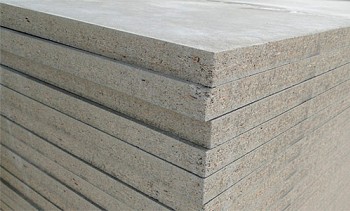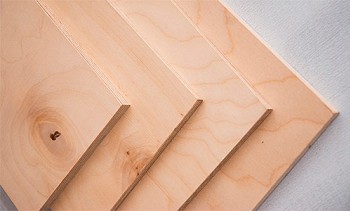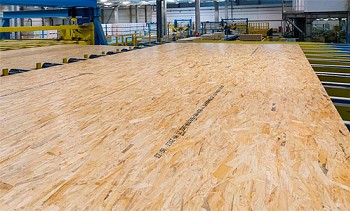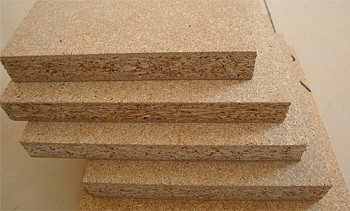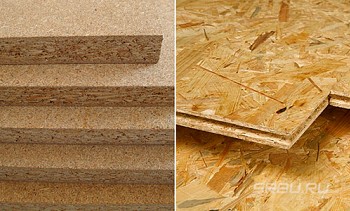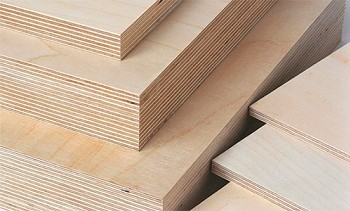Oriented particle board (OSB or OSB in a foreign manner) is a modern, very popular and affordable material for the construction of lightweight structures and structures. It is convenient to mount. Slightly uneven, structural surface gives room to imagination and does not limit the possibilities for decoration. In order for surfaces made from OSB to serve for a long time, they must be protected from the negative effects of environmental factors. One way to protect the OSB is to paint it. Next, we will tell you how to paint the OSB plate, how to apply paint or varnish, how to process the joints and prepare the surface for painting.

Content:
What features should be considered when choosing paint for OSB
When choosing a paint coating for OSB, it is necessary to take into account certain features of this material.
Adhesion of coatings and OSB boards
Some paints very poorly adhere to the surface of the OSB board due to poor adhesion between the materials. This happens because OSB boards are initially saturated with resins and do not absorb paint well. For OSB staining, it is not recommended to use a water-based paint and other water-soluble formulations. Acrylic or other polymer-based formulations must be preferred.
OSB plate texture
A feature of this material is pronounced texture. The surface of the plate is uneven, rough - this increases the consumption of paint and requires preliminary preparation before painting.

OSB age plate
The worst affected are OSB staining of slabs that were not protected in time by coatings and stood on the street for more than one year. Under the influence of ultraviolet radiation and humidity, the surface quality of the OSB plate is greatly deteriorated. Even paint specially designed for OSB boards does not fit well on such surfaces. In this case, for high-quality painting, surface cleaning from dirt, grinding and processing with antiseptics are needed.
How to paint OSB plate on the street
If you choose a paint for outdoor use, make sure that it contains special additives that protect against ultraviolet radiation. Otherwise, under the influence of sunlight, the surface will quickly stratify and require re-painting.
Choosing how to paint the OSB board from the outside, preference should be given to paints based on polymers, which are recommended for coating wooden surfaces. They fit well on an uneven surface, reliably protect the base from ultraviolet radiation and precipitation. Before applying a coat of paint, prepare the surface, level it and apply a primer. Large openings and joints are better putty.
When applying paint, follow the manufacturer's instructions. Continuous coloring in one color favorably sets off the expressive structure of OSB boards and prevents the penetration of moisture.
For painting exterior walls and facades are suitable:
Oil paints.
This is one of the best and most reliable options. They are quite viscous and weakly absorbed into the stove. This paint dries for a long time, but forms a strong protective layer with good performance.
Modern alkyd enamels and specialized alkyd-based paints for wood panels.
They penetrate deep into the structure of the plate and serve for a long time. Walls painted with alkyd paints do not need to be coated with protective varnish on top - this significantly reduces the cost of decoration.
Acrylic paints.
They well cover irregularities and allow you to achieve a uniform tone.If you treat the exterior walls with a mold resistant primer, you can paint them with high-quality waterproof acrylic paints.
Professionals believe that the choice of material for painting OSB boards on the street is due to the characteristics of the board itself and the conditions of its operation. Modern waterproof polymer-based coatings better protect the walls from moisture and active ultraviolet penetration than water-based paints. At the same time, acrylic paints make it easy to wash and clean painted plates, and compositions based on latex, alkyd resins or polyurethane form a resistant impermeable film on the surface.
How to paint OSB plate inside the house
When choosing paint for interior decoration, it is necessary to consider compliance with environmental requirements. Not all varnishes and compositions based on polymers can be called harmless to health.
If you have to paint OSB boards indoors, you better stop at the following options:
Acrylic paint.
It is perfect for walls and floors inside the house. The surface is uniform in tone, leveled, with a good coating.
Stain + varnish
If you prefer the natural texture of OSB boards, use the idea popular with designers. They advise using a stain or patina effect to give the desired shade, and then cover the surface of the plate with varnish, vinyl or polyurethane.
Separately, it is worth mentioning about such a variety of paints and varnishes as glaze glaze. Glaze glazes are transparent, subtle paints that can give wood a certain shade and maintain texture. Lazur can be produced both on acrylic and alkyd based. Acrylic-based lazuli, as a rule, can be used both for indoor and outdoor use, and on an alkyd base, only for outdoor use.
Some manufacturers allow the use of azure on OSB boards. When using these coatings for exterior decoration of OSB boards, pay attention to the ability of the coating to withstand UV rays. Given the texture of OSB boards and the decorative possibilities of glaze paints, very attractive surfaces of various shades can be obtained.

Preparation of OSB boards for staining
The better you prepare the OSB sheets for staining, the better the paint will lie, the coating will be more stable. They do not advise painting the OSB panels before installation, because you still have to adjust the joints, polish the bumps. It is better to paint an already prepared wall.
Next, we will consider the recommended procedure for preparing the surface of OSB boards for painting.
Step 1 - Grinding
Surface grinding is necessary only to smooth and hide the OSB texture of the plate, as well as in the case of coating the surface with stains. This is best done with a grinder. To make the surface homogeneous, it will have to be carefully sanded. Especially deep grinding will have to expose the OSB-3 and OSB-4 grades, since it is necessary to completely remove the protective coating from varnish and wax.

Step 2 - filling the irregularities with putty
To seal various recesses, oil-glue putty is used. It fills the voids and traces of screws. After this, the boards are additionally ground. It is not necessary to putty seams and joints at the border of the plates - you still will not be able to completely disguise them. After painting, the seams will still be visible. It is better to beat these lines with the help of decorative strips and correctly arrange the sheets of material so that there are no chaotic joints.
Important! When choosing a material, try to select plates where there are no particles of the crust or its content is minimal. During operation, the bark often exfoliates and spoils the appearance of the panels. The paint lays worse, then you have to repeat the entire process of staining. If the OSB of the plate is to be painted outside, this is especially noticeable - because under the influence of ultraviolet, the process of separation is faster.
Step 3 - primer coating
The easiest way is to treat the OSB plate with acrylic or acrylic-polyurethane water varnish diluted with water in a ratio of 1:10. You can also use alkyd varnish, but it should be diluted with white spirit. Apply it slowly, carefully, to absorb better. Another option is the treatment with an adhesive primer like Aqua-filler or analogues. It is especially good if light paint is used, and reliably protects from emerging stains from tar and essential oils on the surface.

Step 4 - Dyeing and Drying
It is important to follow the correct procedure:
1. At first it is recommended to apply paint with a brush on the edges, around the perimeter of the panel. Here you need 2-3 layers.
2. Then the paint roller is evenly distributed over the entire surface. Movements must be done in one direction.
3. After drying at a uniform temperature and no drafts for 8 hours, a second coat of paint is applied. If you want to keep the texture, try to put a thin layer. You can increase the number of layers and achieve a perfectly flat surface.







